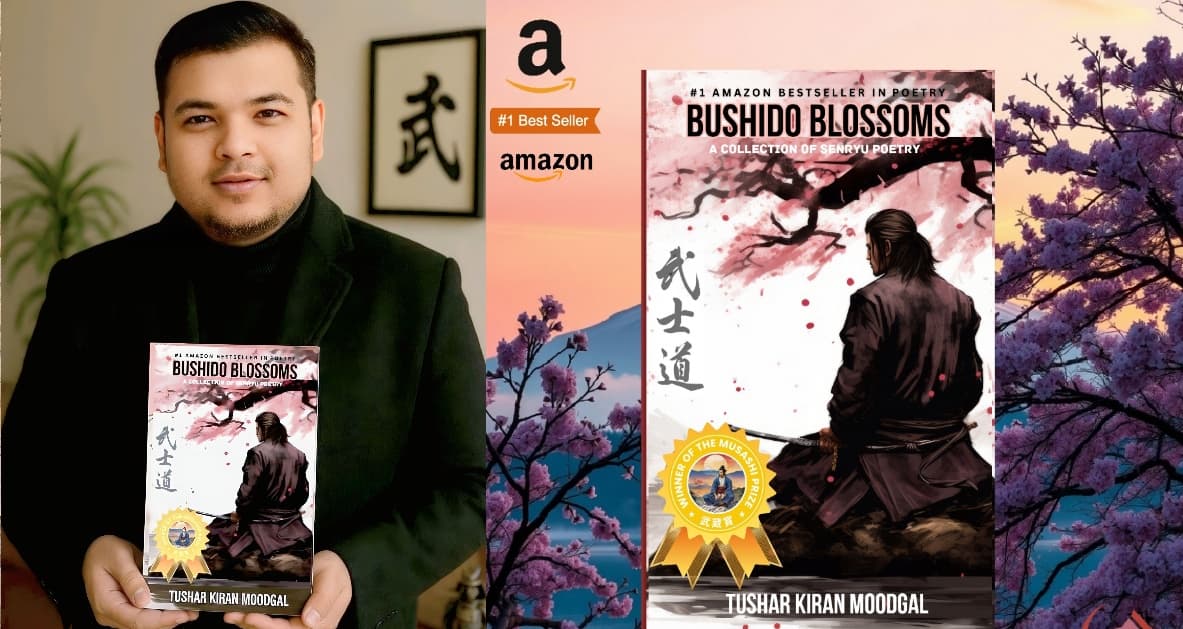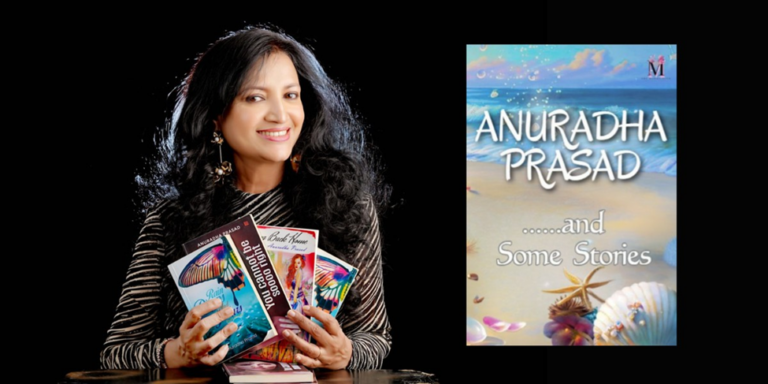
Tushar Kiran Moodgal
The Delhi-based poet has been at the forefront of reviving the old-school ethos of philosophical poetry.
Tushar Kiran Moodgal has published two poetic works: Lamentations (2023) and Bushido Blossoms (2025). Both these books incorporate a vastly different style, showcasing the range of the bard. While Lamentations is largely an ode to the romantic era poets with a dash of gothic imagery and narrative pieces with philosophical underpinnings, his latest offering, Bushido Blossoms, is a collection of senryūs, a form of Japanese micropoetry similar to haiku which emphasises human nature and emotions with undertones of cynicism and dark humour. The book is an homage to the ethos of Bushido – the way of the warrior and the martial traditions of Japan – and it has earned Moodgal the Musashi Prize.
Through the art of senryū Moodgal showcases a deep reverence for the virtues of honour, discipline, and integrity. He incorporates these ideals, synonymous with the Samurai, into the poignant brevity of senryū poetry, thereby capturing the delicate duality of existence just like the cherry blossoms. In one of the senryūs, Moodgal writes:
“Through agony’s fire
I emerge with kinder hands
growth forged in the flame”
The poem reads smoothly and rhythmically, so the slight overage doesn’t disrupt its impact. A reflective and redemptive piece, it captures a powerful theme: personal transformation through suffering. Unlike the more observational or humorous tone of traditional senryu, this leans into the emotionally profound, a trait more aligned with modern interpretations of the form. It explores the idea that pain can soften rather than harden someone, which is a nuanced take and refreshingly human. The twist, that suffering leads not to bitterness but to kindness, is unexpected and emotionally resonant. The imagery is strong. “Agony’s fire” and “forged in the flame” draw on the metaphor of metal being shaped in heat – a classic but effective symbol for transformation.
Bushido Blossoms has 300 such powerful senryūs which grapple with themes of personal loss, transience of life, morality, beliefs and ideals, self-mastery, willpower, importance of action and many such topics which form the core of the Bushido philosophy. Throughout the book, Moodgal uses the imagery of Japanese martial objects such as the katana, armour, shield, dojo, etc., to convey his philosophical meditations to the reader.
In one of his senryūs from the thematic set titled “Clarity of Purpose”, Tushar Kiran Moodgal writes:
“Naginata’s swing
no motion without meaning
focus shapes the way.”
The tone is contemplative and disciplined; the language is clear, minimalistic and effective, reflecting martial philosophy, specifically the precision and intentionality behind movement in martial arts. The reference to the Naginata (a Japanese pole weapon) immediately grounds the poem in a specific cultural and martial context, which sets it apart from more generic meditations on focus or mindfulness.
While senryū often explore the quirks and ironies of human nature with wit or satire, the majority of Moodgal’s senryū pieces lean towards a more serious and inspirational tone, something which is more typical of haiku or motivational poetry and might irk some purists. That said, senryu has evolved and now often includes emotional introspection, so this approach still fits within modern interpretations and beautifully achieves the goal which the Shahdara-born poet set out to achieve through Bushido Blossoms.
That said, there isn’t any shortage of emotional depth in the book. In fact, Tushar Kiran Moodgal begins his senryū collection with a personal tragedy. He writes:
“Post his funeral
sweat of my father’s labour
adorn his shirt still.”
The tone is sombre, intimate, and deeply personal – something the reader is not ready for when he sits down to read for the first time. The pacing is deliberate and quiet, allowing the weight of each line to sink in – a fitting rhythm for the subject matter. The senryu captures the raw immediacy of grief, not through overt sentimentality but through a striking, understated detail. It deals with themes of mortality, legacy, and the physical remnants of a life lived through hard work. This is not a philosophical meditation but a moment of lived experience. That’s what makes it powerful – it doesn’t try to universalise the pain or dress it in metaphor. It simply shows. The imagery is stark and evocative. “Sweat of my father’s labour” is a potent phrase that conveys years of effort, sacrifice and dignity through the trace of something as ordinary and human as sweat. The fact that it still “adorns” his shirt posthumously implies how deeply woven his work and identity were and how those traces linger even in death.
The final word, “still”, is doing a lot of quiet emotional work. It suggests time paused as grief freezes the moment. It also carries a subtle double meaning: the sweat is still there physically, but also metaphorically, the impact of the father’s life and labour still remains.
In the preface, Moodgal states:
“The opening poems may initially seem to diverge from the overarching theme, but they truly do not. These verses were written on the deeply tragic day my beloved father passed away. To me, he was nothing less than a samurai—a warrior bound by an ethical code, who faced life’s trials with courage and resilience.” He further writes, “I admit, beginning with such sorrow is unconventional for Senryu, a form not typically associated with tragedy. However, I chose it for two reasons: first, it is a poetic form very close to my heart, and second, at that moment, my father’s departure felt like a cruel jest by life itself. But perhaps that’s a story for another book.”
This explains the poignant entry point into his senryu collection, grounding the work in personal grief while aligning it with the spiritual and philosophical essence of Bushido. By framing his father as a samurai, an emblem of discipline, honour, and resilience, Tushar Kiran Moodgal bridges the deeply personal with the universally noble, setting the emotional tone for the rest of the book. The decision to open a traditionally light or observational form like senryu with such sorrow is a bold artistic choice that redefines the boundaries of the genre, reflecting how grief can co-exist with clarity and restraint. It contextualises the initial poems not as thematic outliers but as emotional foundations, echoing the Bushido ideal of maintaining composure and meaning in the face of loss. The extract deepens the reader’s engagement, not only with the poet’s pain but also with his reverence for his father, for discipline, and for the poetic form that helps him endure.
Tushar Kiran Moodgal draws inspiration from legendary figures such as Miyamoto Musashi, Sakamoto Ryōma, Oda Nobunaga and Zen Masters like Taisen Deshimaru, Kodo Sawaki and others. His work explores the balance between resilience and simplicity, urging readers to find harmony amid the chaos of modern life. Through Bushido Blossoms, he not only honours the legacy of Japanese philosophy but also offers a lens through which readers can discover inner strength and celebrate the extraordinary within the ordinary. This collection is a testament to his belief that poetry, much like the samurai’s code, serves as both a mirror and a guide to understanding the complexities of the human spirit.
It is only fitting that Tushar Kiran Moodgal was awarded the Musashi Prize, a literary honour conferred upon authors whose work preserves and innovates within the classical Japanese traditions such as the haiku, senryū, and tanka, as well as prose forms like novels and short stories. Named after the iconic swordsman, strategist, and philosopher Miyamoto Musashi, who Moodgal cites as one of his inspirations, the Musashi Prize is one of the Kalam Writer’s Forum’s respected literary honours.
“It fills my heart with abundant joy to announce that ‘Kalam Writer’s Forum of Bengal’ has conferred upon me the prestigious Musashi Prize for my Senryū poetry work, ‘Bushido Blossoms’. The legendary ronin, Miyamoto Musashi, has had a deep impact on me ever since I read his philosophical/martial text ‘The Book of Five Rings’, so to receive an award named after him is an absolute honour for which I shall be eternally grateful to KWFB and Dr Banerjee.” Tushar Kiran Moodgal quoted via his Instagram page.
In an era where agenda-driven, banal statements with line breaks are often passed off as profound poetry, Moodgal’s effort to return to traditional poetic forms and fuse them with his literary and philosophical insight is not only commendable but artistically significant. While he largely adheres to classical structures, he brings a sense of freshness that feels both engaging and invigorating. We may not know what comes next from his literary arsenal, but one thing is certain: we’ll be watching closely as Tushar Kiran Moodgal continues to inspire a new generation of poets.





